Article Overview: Pros & Cons of Living in Philadelphia
Considering moving to Philadelphia? You’re in good hands.
I’ve been living in Philadelphia for 6 years and thought it might be helpful to jot down some of the pros and cons of moving to The City of Brotherly Love.
When most people think about Philadelphia they think of The American Revolution, Philly cheese steaks and those epic scenes from Rocky. But there’s so much more to the city.
A modern city, steeped in history, the city is full of tight-knit communities that embraces newcomers all the same. But I’ll be frank, living in Philadelphia isn’t for everyone, let’s dive into the things you should consider before making a move.
Note: This article was written by Michael Brandt as part of the Local Living Series, wherein locals share honest insights of living in a specific city through comprehensive pros and cons lists. If you’d like to reach out to Michael directly with questions, please do so in the comments below.
Living in Philadelphia
Visiting Philadelphia before finalizing your decision? If helpful, here’s the one hotel I recommend to my own family and friends.
First, the perks of moving to Philadelphia
#1. Big town amenities, small town vibes
One of the best parts about living in Philadelphia? It’s the way the city masterfully blends big-town amenities with those cozy small-town vibes.
Imagine living in a place that’s got all the energy and opportunities of a bustling metropolis, but it still feels like your friendly neighborhood at the end of the day. Well, that’s Philly for you.
We’re talking world-class museums, top-tier universities, thriving nightlife, and let’s not forget – a food scene that’s got everything from mouth-watering cheesesteaks to high-end dining.
It’s like living in a perpetual buffet of cultural and social options. But amidst all that hustle and bustle, Philly’s got this knack for feeling surprisingly intimate.
Maybe it’s the row house neighborhoods, each with its unique flavor and tight-knit community. Or the abundance of parks and green spaces where you can escape the city’s pace.
Or perhaps it’s the way people here seem to know their neighbors and look out for each other. I mean, it’s called the City of Brotherly Love for a reason, right?
So, if you’re looking for a place that gives you the best of both worlds – the excitement of a big city and the comfort of a small town – Philadelphia’s got you covered.
#2. Prime east coast location
Now, if you want to talk about Philadelphia’s strategic location, let’s break out the numbers, shall we? Positioned snugly between New York City and Washington D.C., Philly is practically a stone’s throw from these iconic cities.
A mere 1.5-2 hours by train, or a 2-3 hour drive, and voila – you’re in the Big Apple or our nation’s capital.
But it’s not all about city living. When nature calls, you’re about a 2-hour drive from the picturesque Pocono Mountains, or around 1.5 hours to the Atlantic waves on the Jersey Shore.
Even closer to home, just about an hour’s drive will find you in the heart of serene Amish country.
And of course, let’s not forget about Philadelphia itself, a city steeped in history and brimming with cultural gems. Basically, Philly’s got prime real estate when it comes to accessibility. You’re never far from a change of scenery, be it urban excitement or outdoor adventure.
#3. Low cost of living
If you’re skeptical about Philadelphia’s impressively low cost of living, allow me to arm you with some specifics. Despite being the sixth-largest city in the U.S., Philadelphia offers an appealing affordability that sets it apart from many other metropolises.
And that’s not just talk – the numbers really do back it up.
Let’s break down housing costs. As of 2023, the median home value in Philadelphia is significantly lower compared to the national average.
And if you’re looking to rent, you’ll find that the average rent in Philly is well below what you’d pay in cities like New York City or Washington D.C.
Moving on to everyday expenses, a 2022 report showed that healthcare costs in Philly are 6% below the national average, and groceries cost about 4% less.
And it’s not just about necessities – affordability extends to leisure too. Philadelphia’s food scene, known for its diversity and quality, offers a range of dining options that won’t break the bank. Plus, Philly’s tax rates are often lower compared to other East Coast cities.
For example, the sales tax here is 6%, which is significantly lower than New York City’s 8.875%. So, in the grand scheme of things, living in Philadelphia offers you the vibrant life of a major city, but with a price tag that’s a lot friendlier to your wallet. That’s pretty good math if you ask me.
#4. History is everywhere
Living in Philadelphia is like being in a time machine, but without having to give up your smartphone or modern conveniences. The history here is as thick as our famous Philly cheesesteak, and trust me, it’s every bit as delicious to delve into.
First off, this is the city where the Declaration of Independence and the U.S. Constitution were signed. Just think about that for a moment – these streets have seen the birth of a nation. Then there’s Independence Hall, the Liberty Bell, the Betsy Ross House – each one a living testament to the city’s revolutionary past.
But Philly’s history isn’t just kept behind glass in museums. It’s woven into the city itself – in the colonial architecture of Old City, the cobblestone streets of Society Hill, the vibrant murals that narrate local history. Living in Philadelphia is like having a front-row seat to the grand play of American history.
And it’s not just a glimpse into the past, it’s a tangible, vibrant part of city life that makes Philly truly unique. It’s like living in a city that’s as much a historian as it is a metropolis.
#5. Excellent public transportation
Having a great public transportation system is one of the biggest perks of living in Philadelphia because you can get by without a car.
Philadelphia’s robust public transportation system offers more than 70 bus routes, a subway and rail system. About 25% of residents use public transportation and with average commute time of 45-minutes, it’s not hard to see why.
Thanks to the extensive public transportation network, residents of Philadelphia are far less beholden to relocating within a small radius of their job when moving to Philadelphia.
#6. Art and museums galore
Philadelphia’s rich history has made it home to many notable educational institutions, museums and galleries. From the Museum of the American Constitution and the Franklin Library to the National Museum of American Jewish History — the options span the gamut.
More eclectic venues include the Mutter Medical Museum, which is dedicated to medical specimens and history, and the Mummers Museum, which celebrates the Mummers parade tradition. Philadelphia also boasts several large art museums and an ever-growing collection of art galleries, cooperatives and studios.
Needless to say, you’ll find it hard to be bored after moving to Philadelphia.
#7. Philadelphia is a walk-able & bike-able city
Small, walkable neighborhoods with abundant sidewalks and excellent public transport make Philadelphia a terrific city for walkers. While relatively narrow streets can make bike riding a bit trickier, the city is still ranked 6th best in the nation for bikers!
Bike-dedicated lanes have been popping up all over Philadelphia, and the plethora of greenways and trails are great for bikes, skaters and pedestrians alike.
What’s more, the relatively moderate climate and access to public transportation makes it an easy place for non-car commuters. Many residents enjoy the city without owning a car while living in Philadelphia.
#8. Great public parks
For a city of its size, Philadelphia has a remarkable amount of green space. Fairmount Park alone spans 4,200 acres and is considered one of the largest urban park in the U.S. It features peaceful trails, rolling hills, waterfront esplanade and forested areas all for public enjoyment.
But it gets even better. The city of Philadelphia’s Trail Master Plan aims to add even more greenways and trails to the city. The plan is to link up various neighborhoods and create a more walkable & environmentally-friendly city.
And it’s not just the big parks either. Philly’s got an array of smaller parks and squares that add a touch of green to the cityscape. Rittenhouse Square, Washington Square, Clark Park – each one’s a little oasis amid the urban hustle. And let’s not forget about the Benjamin Franklin Parkway, lined with flags and leading up to the iconic Philadelphia Museum of Art.
#9. Diverse neighborhoods
Philadelphia has 25 main neighborhoods, each of which has its own distinct vibe and unique culture. Whether you are searching for luxury, or hoping to set down roots in an ethnically diverse, working-class area, you will find it while living in Philadelphia
When I wander through Center City, I find myself amidst a myriad of historical landmarks, trendy boutiques, and a wide range of restaurants. Stepping into Old City feels like a time travel experience, with its cobbled streets and 18th-century homes narrating tales from Philadelphia’s past.
If I’m in the mood for something more contemporary, I head to Fishtown or Northern Liberties, where dynamic street art, unique shops, and youthful energy fill the streets.
But the charm of living in Philadelphia isn’t limited to its city center. On the west side, there’s University City. With institutions like the University of Pennsylvania and Drexel University, it’s a neighborhood where academic life and youthful energy coalesce.
A stroll southwards takes me to the Italian Market in Bella Vista, a place that gives off the vibe of a small Italian town right in the heart of the city. And there’s no forgetting Chinatown, a cultural gem, and Manayunk with its bohemian flair.
#10. Quality education
A lot of folks move to Philadelphia for the well-known universities, whether for themselves of their kids. In fact, Philadelphia is home to the one of the largest collegiate populations in America.
Some of the city’s top universities include Temple and Drexel Universities and the University of Pennsylvania. Interestingly, a higher than average number of the city’s students choose live in Philadelphia after graduation, driving the average age of Philadelphia residents down.
This shifts the dynamic of the city and gives daily life in Philadelphia a more energetic vibe.
#11. Kid-friendly city
Honestly, Philadelphia really doesn’t get enough credit for being an absolute haven for kids. It’s brimming with a multitude of activities, museums, parks, and hands-on experiences that could keep any child entertained. In fact, the city feels like one big, interactive playground with an educational twist that the kiddos hardly notice!
Consider the Please Touch Museum – where the name says it all. Kids are actually encouraged to interact with exhibits, breaking the usual ‘look don’t touch’ museum rule. Then there’s the Philadelphia Zoo – and we’re not talking just any zoo, but America’s very first zoo, complete with exciting animal encounters and adventure zones.
And the Franklin Institute? A dream come true for any curious mind, with everything from a giant walk-through heart to an astronomy tower. Plus, the city parks are constantly buzzing with activities like puppet shows and music performances.
So, when it comes to keeping kids engaged and entertained, Philadelphia more than delivers. It’s not just kid-friendly; it’s a kid’s wonderland and that’s something to rave about.
An added bonus: children who grow up in Philadelphia qualify for in-state tuition at the state’s many excellent public universities.
Cons of Moving to Philadelphia
While moving to Philadelphia has many perks, there’s a few things you may not enjoy about living in Philadelphia. With that said, let’s cover the honest cons of living in Philadelphia.
#1. Overcrowding is a thing
I’ve got to be honest, while Philadelphia has plenty to offer, the city does face a fair share of challenges, and overcrowding is definitely high on the list. It’s like the city’s popularity came with a side of sardine-can syndrome, and sometimes it feels like there’s just not enough room to breathe.
Take the morning commute, for instance. You’re more likely to be bumper to bumper on I-95 or the Schuylkill Expressway than not (more on that below). Public transit isn’t much better during peak hours, with SEPTA buses and trains packed to the brim.
Even walking downtown can feel like navigating a maze at times, with the sidewalks overflowing with people. And then there’s the issue of housing. With the city’s population on the rise, affordable housing is becoming increasingly hard to come by, and rents are on the up and up.
It’s a tough situation, and while city living has its perks, the overcrowding in Philadelphia can definitely put a damper on things.
#2. Traffic is horrible
As much as I love living in Philadelphia, I have to admit, traffic can be a real headache here. It seems like no matter the day or time, you’re bound to run into some traffic snarl somewhere in the city. It feels like the City of Brotherly Love sometimes doubles as the City of Bumper-to-Bumper Traffic!
Philadelphia is rated the 9th most congested city in America, which commuters spending an average 112 hours per year in traffic. Ouch.
Rush hour can be particularly brutal. I’m talking about standstill traffic on I-95, the Schuylkill Expressway, and even some parts of the city center. It’s not just the highways, though. City streets can also get congested, making a quick drive across town anything but quick.
And while public transit can be an alternative, the buses and trains are often packed during peak times too. Plus, with roadworks seemingly around every corner, unanticipated delays are more the rule than the exception. So, while there’s a lot to love about moving to Philadelphia, the traffic situation can definitely test your patience. It’s just one of those things that come with big city living, I guess.
As more people move to Philadelphia and the population continues to grow, you can expect to see even more traffic. As an older city, it simply wasn’t built with cars in mind and the recent growth has exacerbated traffic.
#3. Wage taxes
Let’s talk about the elephant in the room when it comes to living in Philadelphia: the wage tax. If there’s one thing that gives Philadelphians a collective sigh, it’s probably this.
The city has one of the highest wage taxes in the country, and trust me, it doesn’t go unnoticed.
Here’s the deal: If you live or work in Philadelphia, you’re subject to the city wage tax. As of my last check, the rate is around 3.8% for residents and roughly 3.5% for non-residents. Now, these might not sound like big numbers, but over time they really add up, especially when you compare them to neighboring areas.
And it’s not just about the money, it’s also about the principle. Many people feel it’s a hefty price to pay on top of federal and state taxes, especially given the range of services and infrastructure in return. So, while the wage tax is a reality of living or working in Philadelphia, it’s not one that everyone’s thrilled about. It’s kind of like a necessary evil in a city that, in so many other ways, is pretty awesome.
#4. Crime problems
In the spirit of transparency, it’s important to acknowledge that Philadelphia, like any major urban area, grapples with crime-related challenges. It’s a tough subject, but one that’s an integral part of the city’s overall picture. Unfortunately, Philadelphia’s crime rates, particularly in relation to violent offenses, have been consistently higher than the national average.
Detailed statistics illustrate the extent of the issue. For instance, at the time of writing the city’s violent crime rate is more than double the national average.
It’s not evenly distributed across the city, of course, with certain neighborhoods experiencing higher levels of crime. Property crimes such as burglary and theft have also been persistently high. A pressing concern has been the escalating gun violence, which the city has been grappling to get under control.
Efforts from local authorities and community organizations are underway to tackle these issues, but meaningful change takes time. Therefore, it’s an ongoing concern for residents and a key consideration for those contemplating a move to Philadelphia. Despite the multitude of positive aspects the city offers, from its rich history to its vibrant culture, the high crime rate remains a difficult aspect of life in Philadelphia.
Of course, the rate and types of crimes in the city can vary substantially between different areas, so check out this interactive crime map can help you to see which neighborhoods are the safest.
#5. Strange liquor licensing laws
Ah, the labyrinth that is Philadelphia’s liquor laws! If you’ve ever tried to buy a bottle of wine or spirits in the city, you’ll know exactly what I’m talking about. The liquor license laws here are not just unusual; they can be downright baffling to anyone not used to Pennsylvania’s system.
Here’s the deal: in Pennsylvania, most wine and spirits are sold through state-run Fine Wine & Good Spirits stores. These are basically the only spots you’re going to find your favorite bottle of Cabernet or a top-shelf whiskey. Need a six-pack or case of beer? Well, you’ll have to head to a beer distributor for a case, or a bar or restaurant if you just want a six-pack. Yes, you heard me right – bars sell six-packs in Philly!
Then there’s the issue of liquor licenses for restaurants and bars. Pennsylvania caps the number of these licenses, so they can be quite pricey for business owners to acquire, with costs often reaching into the hundreds of thousands. This can impact the number of places where you can enjoy a drink with your meal.
#6. Parking nightmares
If you’ve ever driven in Philadelphia, chances are you’ve experienced the city’s notorious parking predicament. To put it lightly, finding a spot to park your car in Philly can feel like striking gold – and I mean winning-the-lottery kind of gold.
For starters, street parking in the city can be a real challenge, particularly in popular areas like Center City, University City, or the historic districts. Between the resident permit zones, metered spots, and confusing signage, just figuring out where you can legally park can feel like deciphering a riddle. Then there’s the competition. With so many people and cars in the city, prime parking spots are in high demand.
Parking lots and garages offer an alternative, but they can get pricey. Daily rates in some parts of the city can run upwards of $20 or $30, which really adds up if you’re commuting daily or staying in the city for a few days. And let’s not forget about the infamous Philadelphia Parking Authority (PPA). Let’s just say their diligence in enforcing parking regulations and handing out tickets is legendary.
#7. Mixed-bag public schools
When it comes to education in Philadelphia, it’s a bit of a mixed bag. The city boasts some fantastic institutions of learning, but there’s no sugarcoating it, the public school system faces some significant challenges. Many parents, educators, and students grapple with these issues every day.
To start with, funding is a perennial concern. Philly’s public schools have struggled with budget shortfalls for years, leading to cuts in essential areas like classroom resources, after-school programs, and even staff. Many buildings are also aging and in need of repair or renovation, which further stretches the budget.
Additionally, academic performance in many of the city’s public schools has been uneven to put it lightly, with some schools struggling with low test scores and graduation rates. This performance gap is a pressing issue, as it contributes to educational inequality in the city.
#8. Cold winters
Let me tell you, when it comes to winter in Philadelphia, Mother Nature doesn’t pull any punches. It’s one thing to watch a lovely, gentle snowfall from the comfort of your warm living room. It’s another thing entirely when that snowfall turns into a full-blown snowstorm, and you’re the one shoveling out your car or navigating the icy streets.
Winters here can get pretty harsh. Temperatures often dip into the 20s or even lower, and combined with the wind chill, it can feel downright freezing. Snow, sleet, and freezing rain are common, and major snowstorms aren’t unusual.
Every winter, it seems there’s at least one or two big storms that bring the city to a near standstill, burying us in a blanket of white.
And then there’s the day-to-day hassle. Bundling up in layers before braving the cold, dealing with the icy roads and sidewalks, shivering at the bus stop – it’s all part of a Philly winter. And let’s not forget about the gray skies. Days are shorter, and it can feel like the sun has gone into hibernation.
Don’t get me wrong, there are some lovely aspects of winter in Philadelphia. The city can look magical under a fresh coat of snow, and there’s something undeniably cozy about watching the snowfall with a hot cup of cocoa. But the day-to-day grind of a Philly winter can definitely wear on you after a while. It’s just one of the prices you pay for living in the City of Brotherly Love.
#9. The job market
Let’s shoot straight here, navigating the job market in Philadelphia can sometimes feel like you’re stuck in a maze. Sure, the city is home to numerous top-tier universities, hospitals, tech firms, and financial institutions. But despite this, finding the right job in Philly can sometimes feel like looking for a needle in a haystack.
There’s a fair amount of competition in the job market here, especially for high-skilled roles. Despite the presence of major employers in sectors like healthcare, education, and finance, landing a job can still be tough, particularly if you’re just starting out in your career or transitioning to a new field.
And while there’s a burgeoning tech scene, it’s not quite nearly at the level of tech hubs like Silicon Valley or Seattle.
Moreover, wage growth in the city has been a bit stagnant compared to other major cities. This can be a little discouraging when you’re juggling the rising cost of living and the city’s high wage taxes. While there are definitely opportunities to be found, you’ll likely need to be persistent and flexible in your job hunt.
FAQ – Living in Philadelphia
Philadelphia can be a great place to live for those who appreciate a vibrant city with a rich history, diverse neighborhoods, and a wealth of cultural attractions, but it’s important to consider the challenges of overcrowding, traffic, and certain aspects of the job market.
Yes, Philadelphia is a very walkable city with beautiful parks, great shops, and a dense city center.
Pros & Cons of Moving to Philadelphia (Post Summary)
Philadelphia is a unique and fascinating U.S. city with a distinct feel that is all its own. There are numerous advantages and disadvantages of living in Philadelphia. Here’s a quick recap.
- Big town amenities with a small town feel,
- Great location for day trips and easy access to other cities
- Low cost of living for the east coast
- Rich history
- Excellent public transportation and commuter options
- Abundance of museums and cultural events
- Walkability and green space
- Diverse neighborhoods
- Fantastic options for higher education
- Great for families
- Congestion
- Overpopulation
- Horrific traffic and air pollution
- Higher city taxes for employees
- Rising crime rates
- Liquor licensing system that prevents many restaurants from serving alcohol
- Difficult and expensive parking
- Variable quality in public schooling
- Cold, wet winters.
- Weak job market
Considering both the advantages and disadvantages of moving to Philadelphia, only you can decide what location best matches your own lifestyle and your individual or family needs.
Whether visiting or living, it’s worth checking out Philadelphia – a truly unique U.S. city.
Comparison of the Pros & Cons of Living in Philadelphia
| Pros of Living in Philadelphia | Cons of Moving to Philadelphia |
|---|---|
| Big town amenities, small town vibes | Overcrowding is a thing |
| Prime east coast location | Traffic is horrible |
| Low cost of living | Wage taxes |
| History is everywhere | Crime problems |
| Excellent public transportation | Strange liquor licensing laws |
| Art and museums galore | Parking nightmares |
| Philadelphia is a walk-able & bike-able city | Mixed-bag public schools |
| Great public parks | Cold winters |
| Diverse neighborhoods | The job market |
| Quality education | |
| Kid-friendly city |
Pin Living in Philadelphia
Map of Philadelphia
Helpful Related Articles
Best Neighborhoods Philadelphia: 15 BEST Neighborhoods in Philadelphia to Live (+ Forum)
Living in Pennsylvania: 15 Honest Pros & Cons of Living in Pennsylvania
Living in Philadelphia: 20 Honest Pros & Cons of Living in Philadelphia
Living in Boston: 22 Honest Pros & Cons of Living in Boston
Living in New York City: 20 Honest Pros & Cons of Living in New York City
Living in Washington DC: 20 Honest Pros & Cons of Living in Washington DC
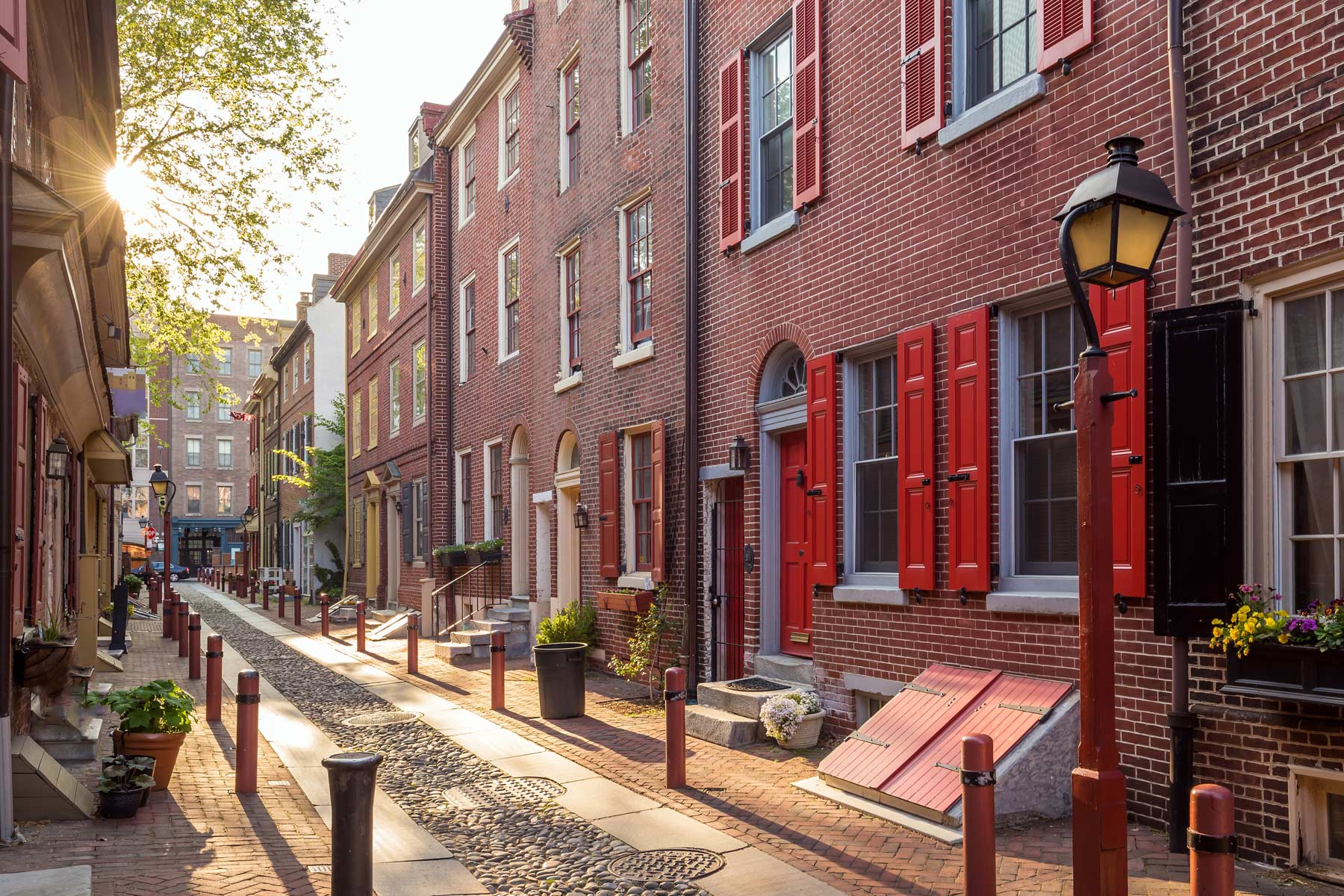
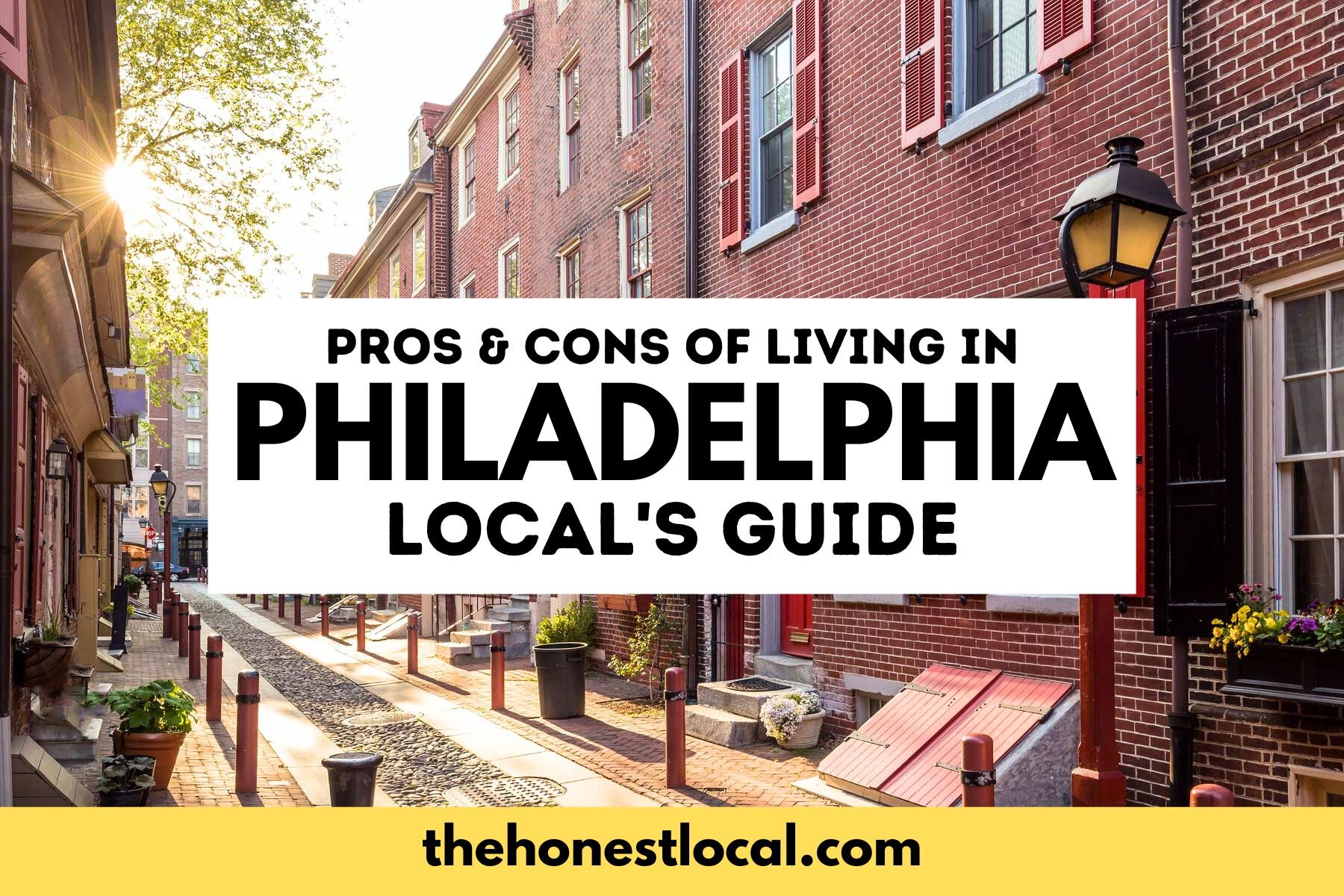
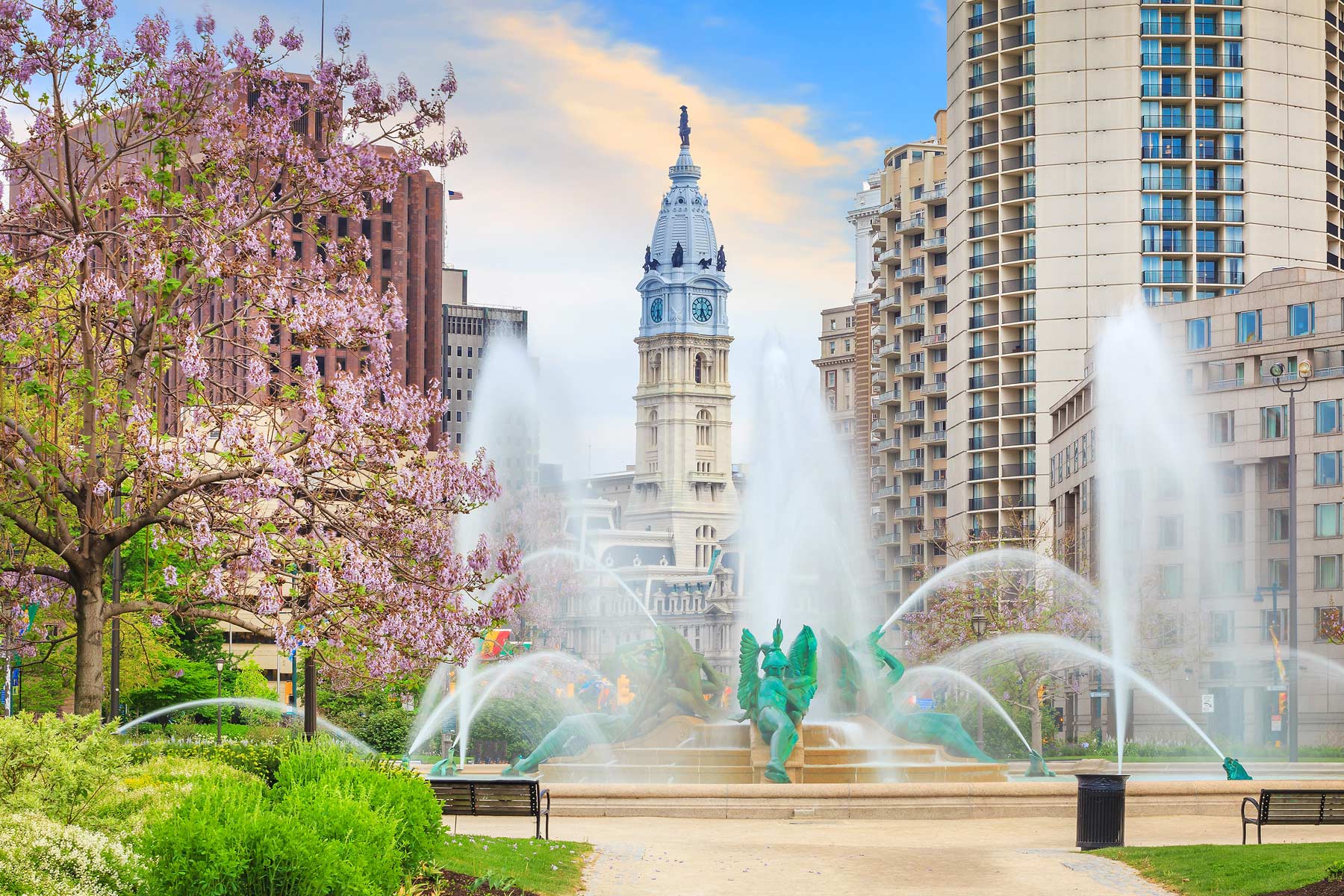
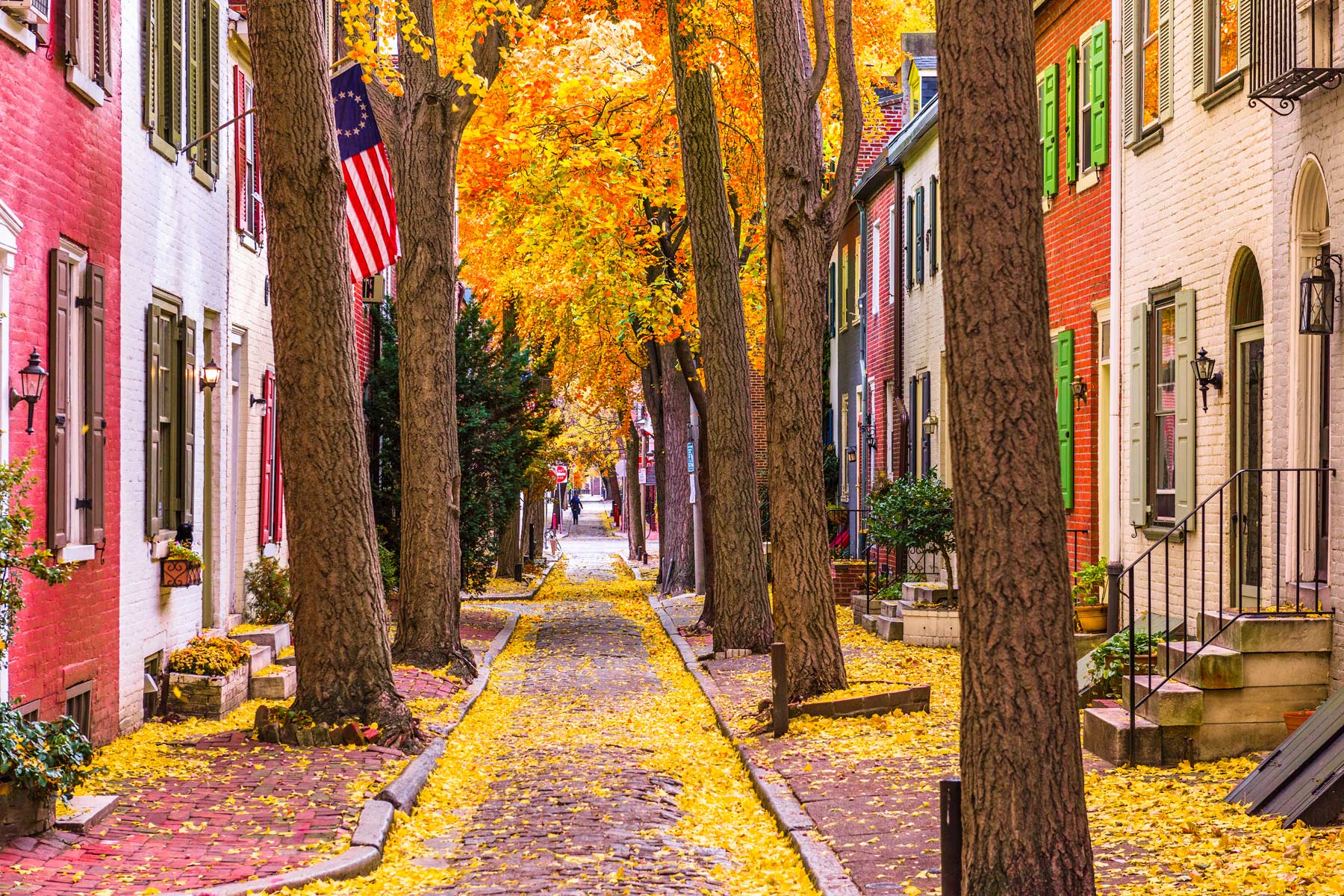
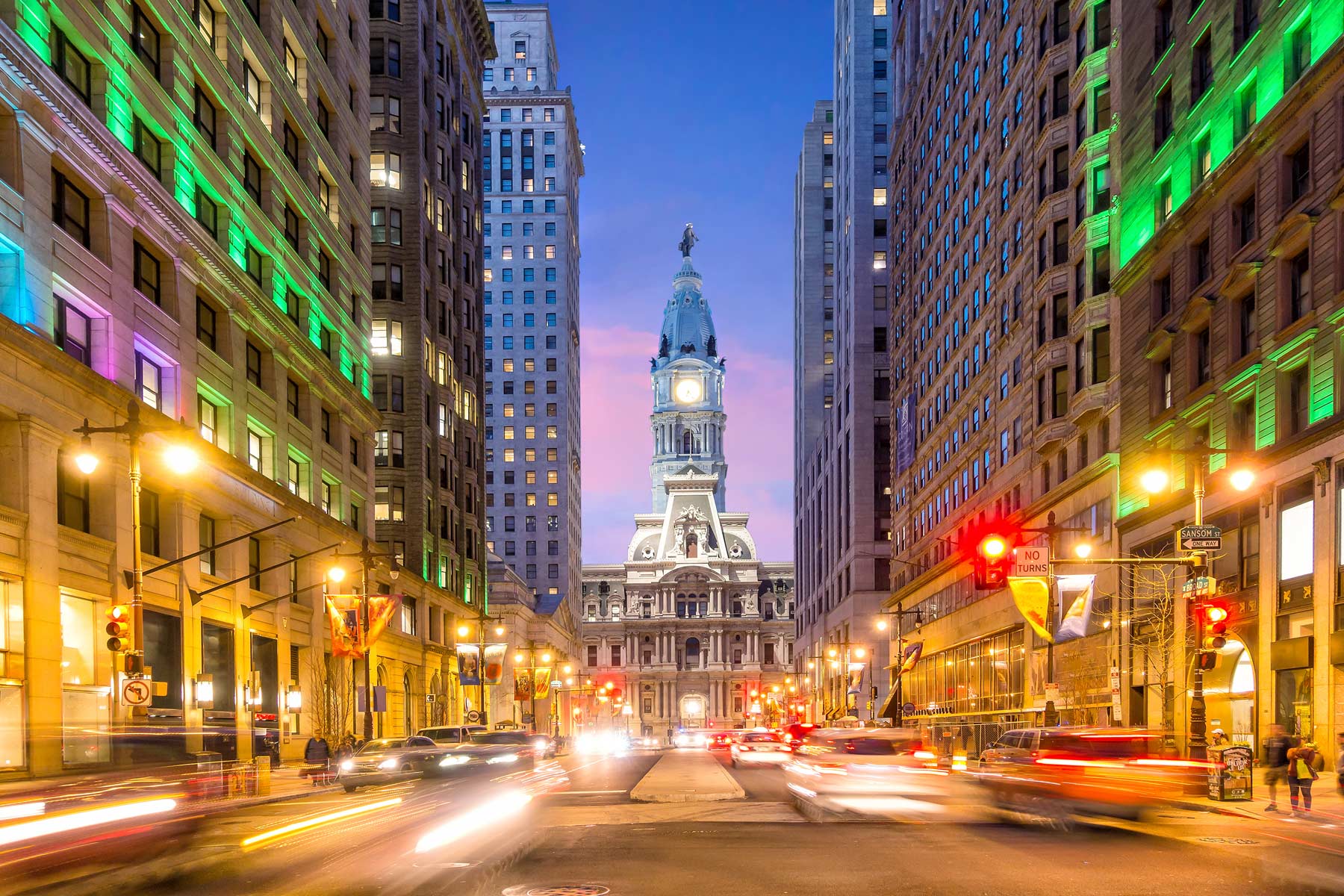
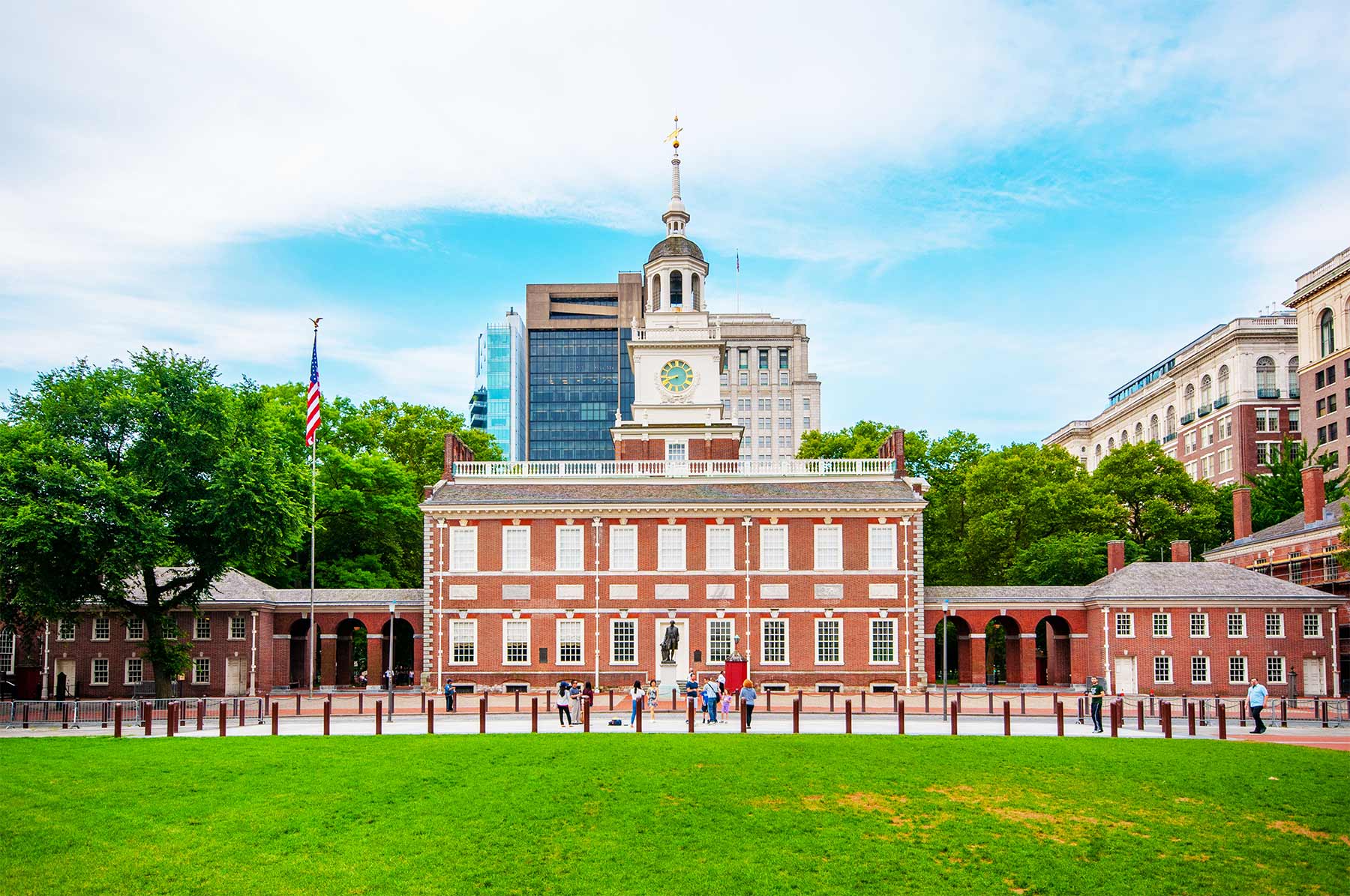

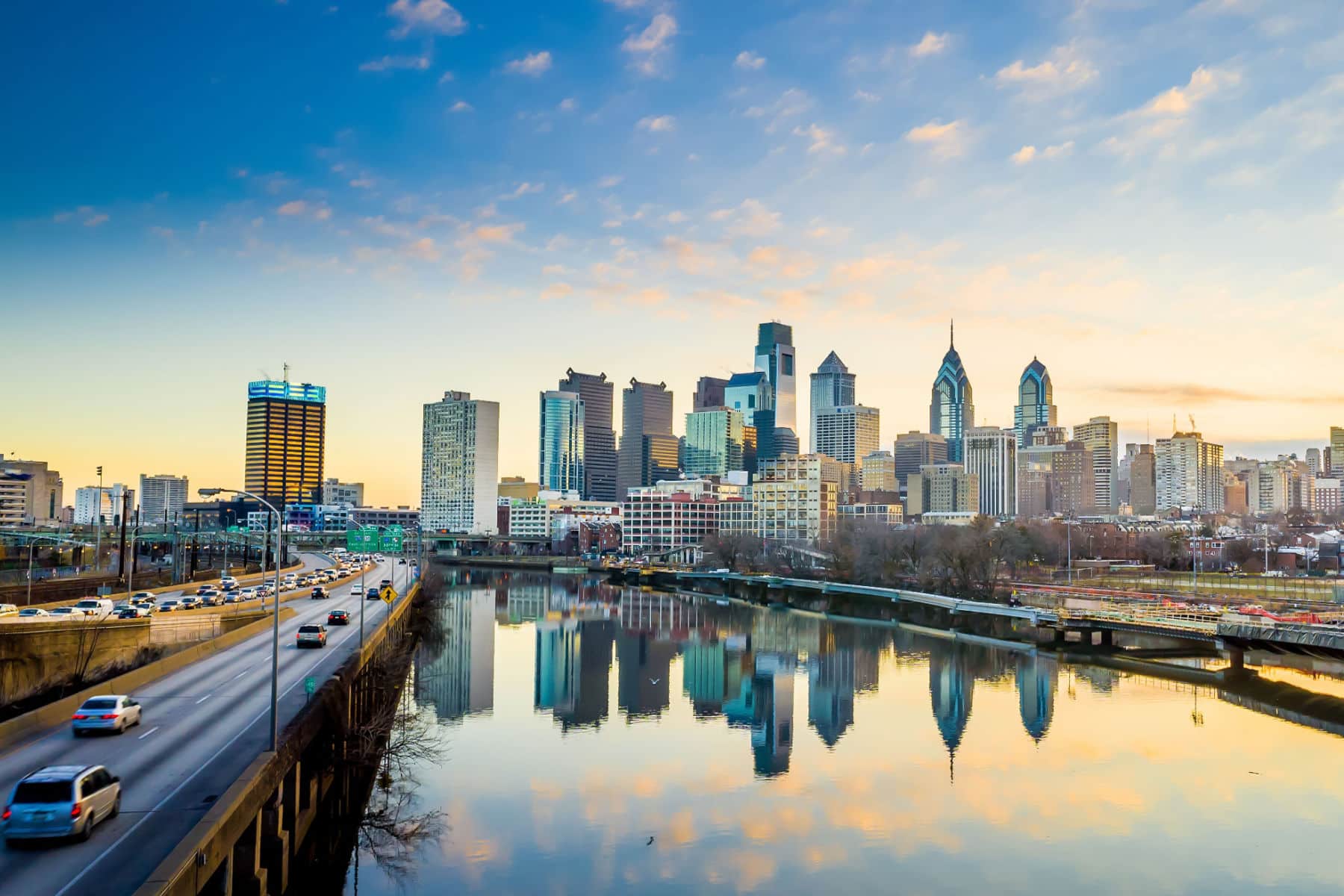
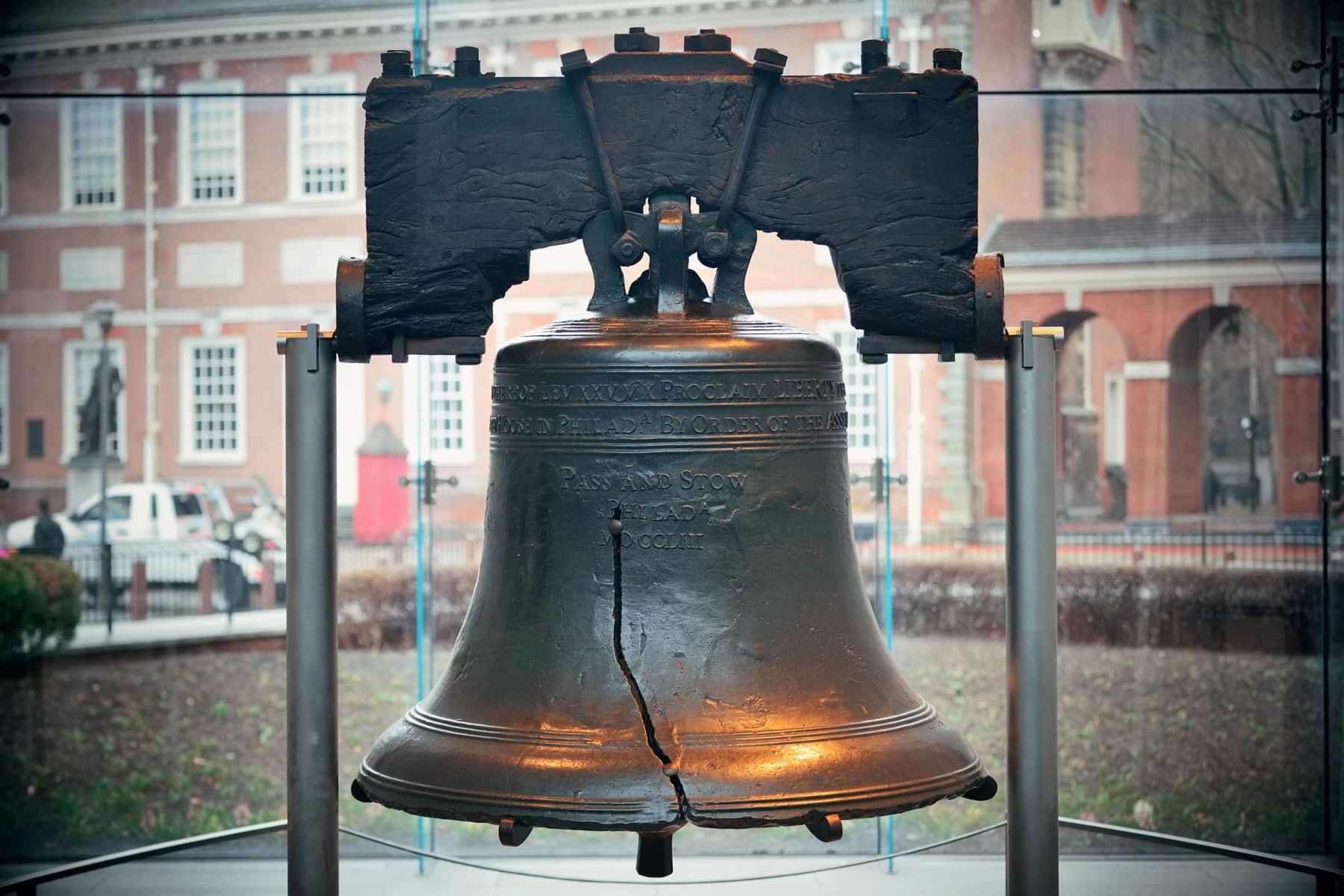
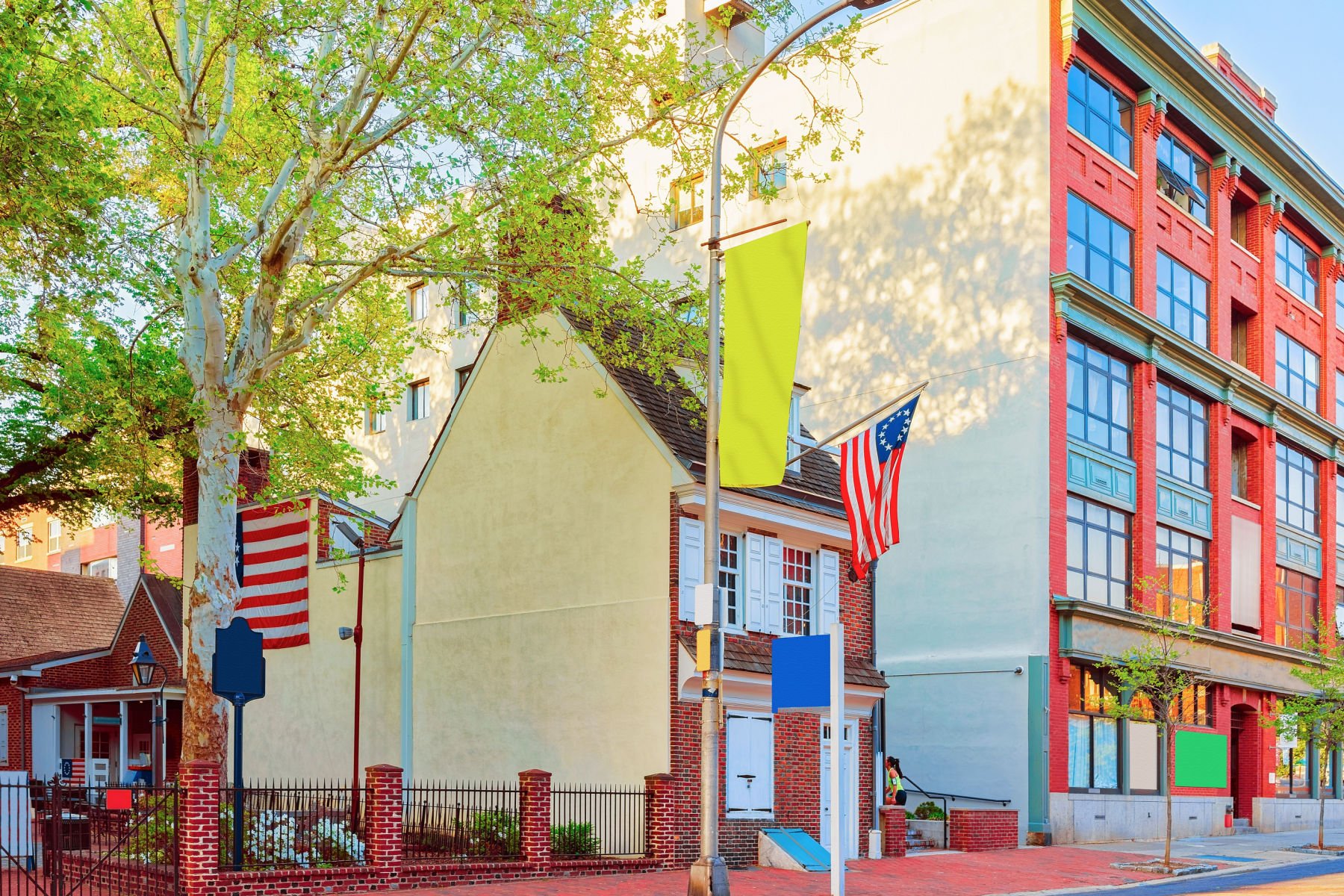
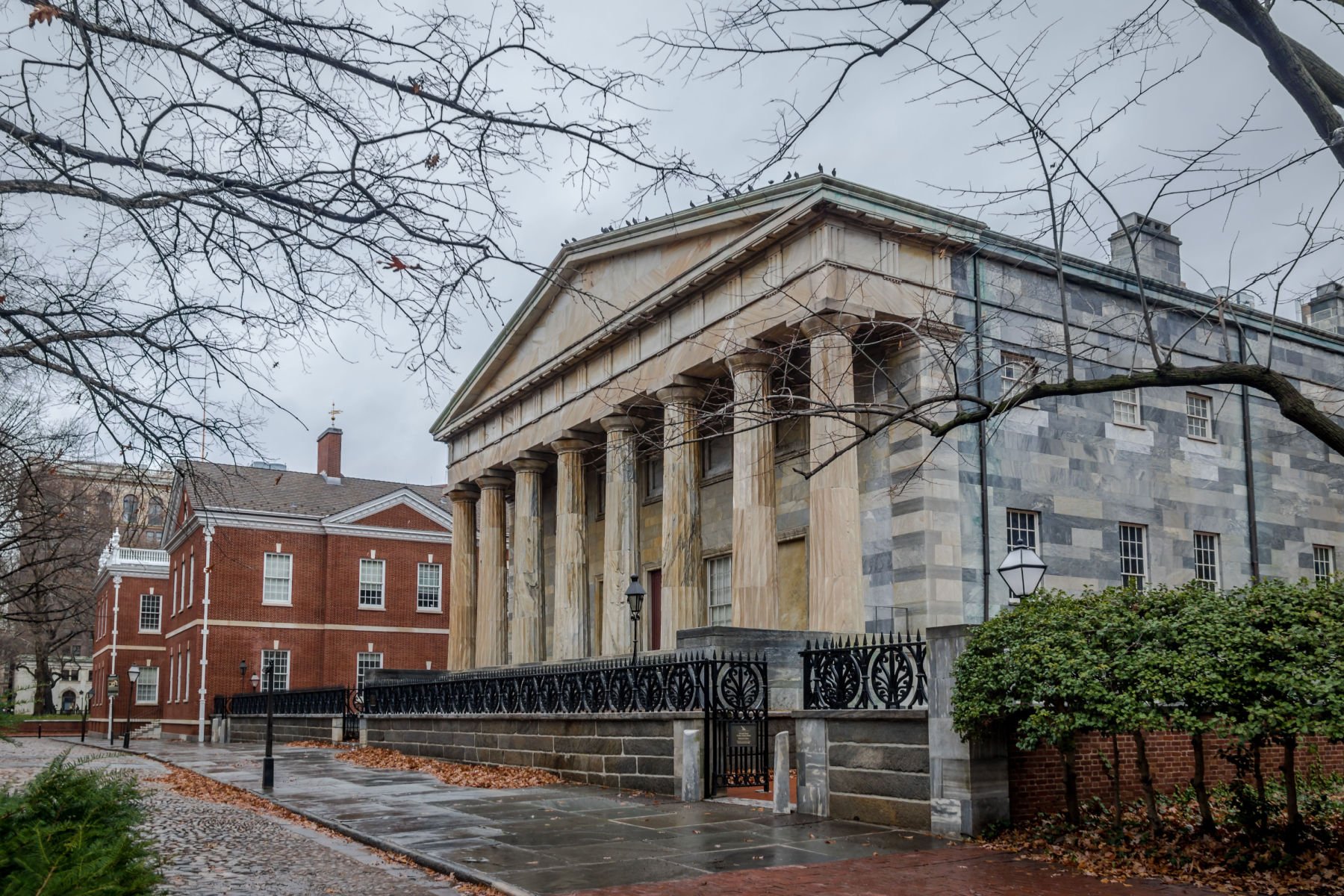
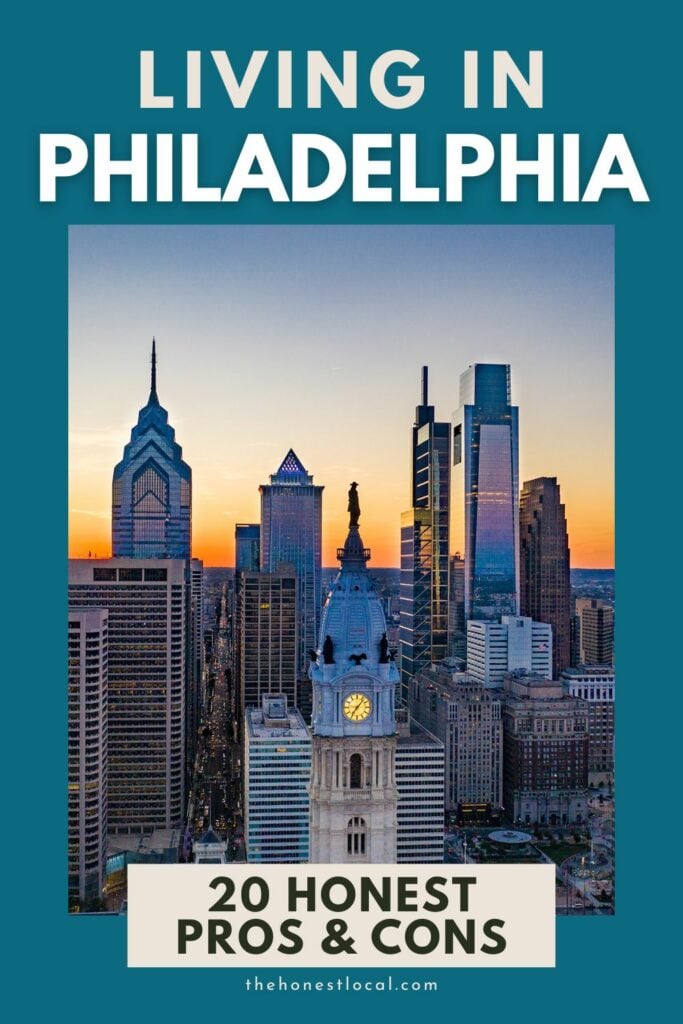
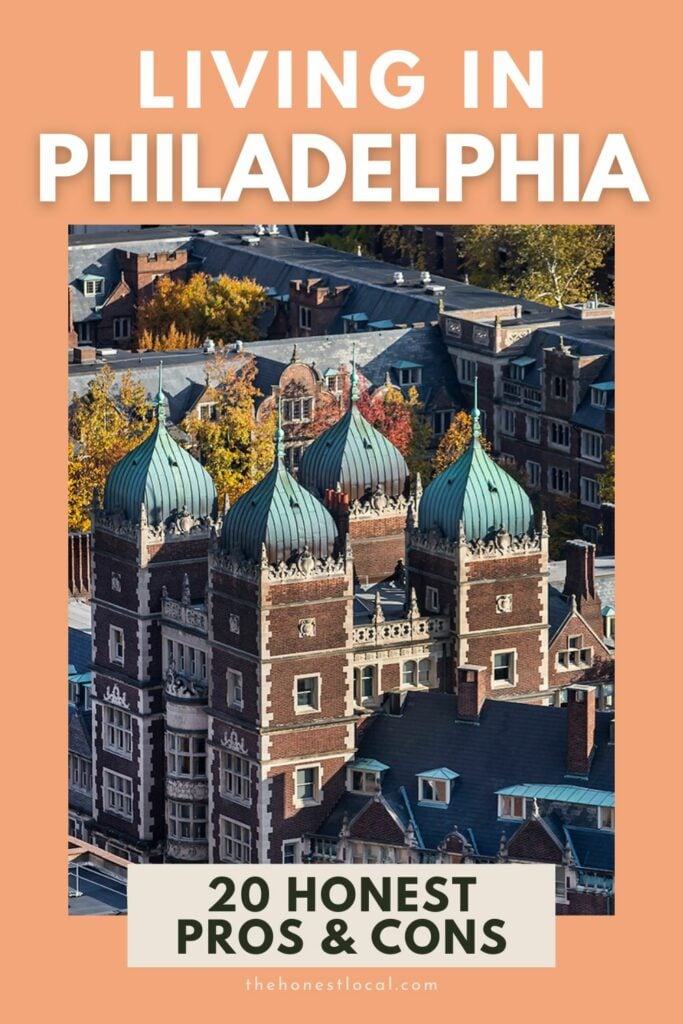
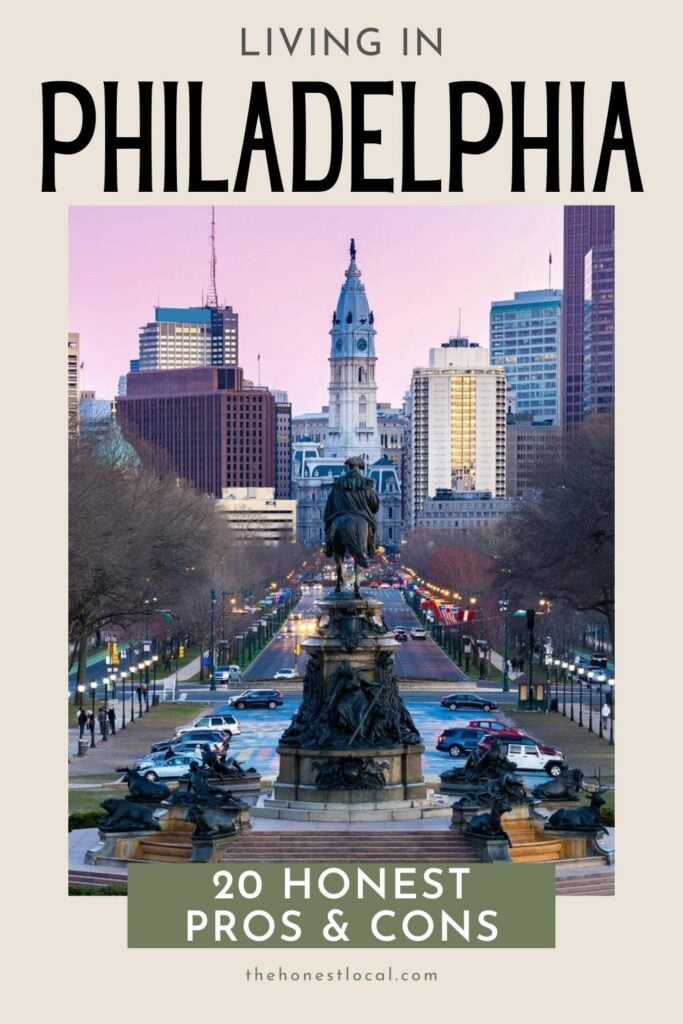
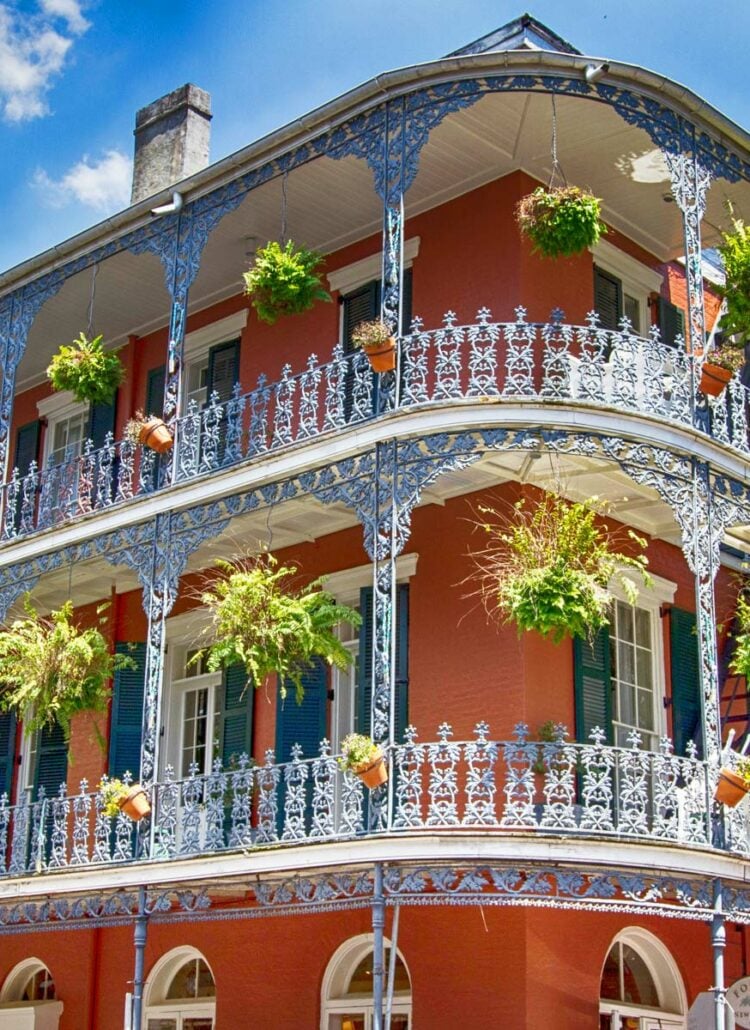
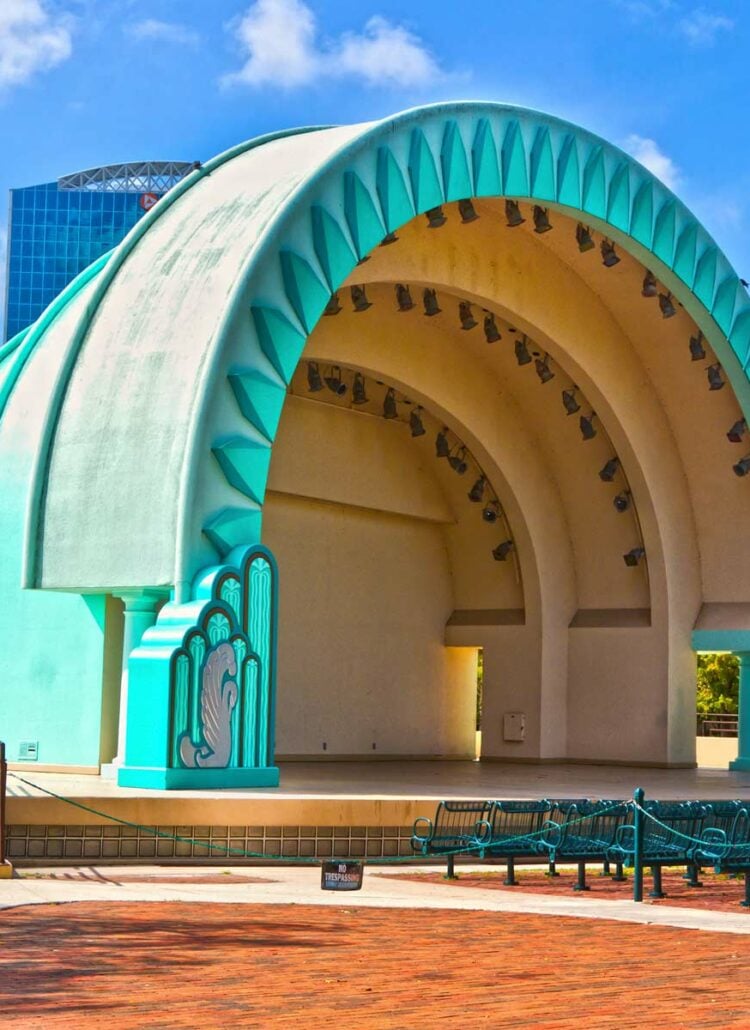
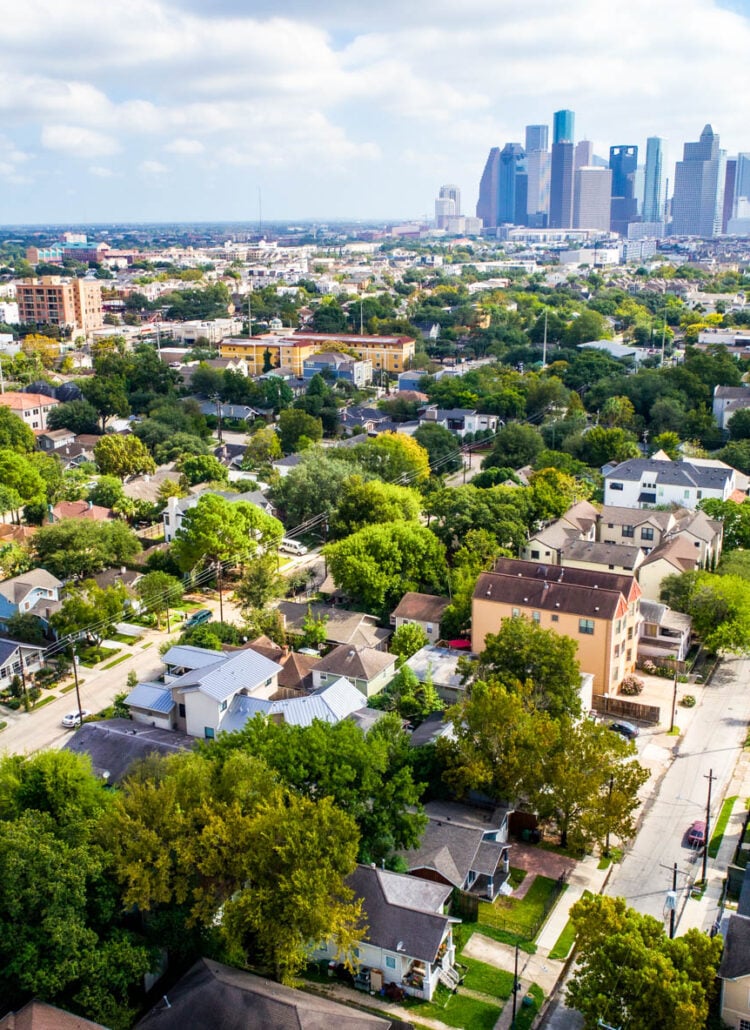


Regarding the difficulty of an establishment getting a liquor license, you left out the silver lining. No, the restaurant can’t serve you alcohol without one. But therein lies the beauty of BYOB! Many (most?) of these places allow you to bring your own alcohol to drink free of charge. So you actually save money by buying a six pack of beer or a bottle of wine or even a bottle of whiskey with you and paying store prices, not restaurant prices. Personally I love the BYOB tradition in Philly restaurants.
After several months here, I’m still in the process of considering relocating to Philly permanently, but I must say, I’m sometimes shocked by how dirty the city is. It varies from block to block, as does much here, but it can be thoroughly disheartening to see so much trash wherever you go… on sidewalks, streets, even in parks. Affluent parts of the city are better, but still. As winter has arrived it seems even more overwhelming, as the lack of greenery magnifies the focus on the trash (and fallen leaves!) that are left for what seems forever, I guess to eventually disintegrate. I can find lots of good, even great things about Philly, but trash and litter is a huge downer.
i think a big con is missing and that is the city is dirty, really dirty. philly has a huge trash/litter/illegal dumping problem and for me is one of the most infuriating things about living here. and i don’t buy the argument that it is a city thing because there are plenty of examples of even more densely populated cities that are much cleaner than philadelphia (eg, boston, amsterdam, miami, madrid). i would argue that philly is the dirtiest major city in the US. it is really a shame because it makes an otherwise really great city feel so undesirable. and the city doesn’t really seem to care enough to do anything about it. it’s only gotten worse in the 5 years i’ve been living here…
I agree 1000%. And also that crime is starting to leak into public areas and areas that use to be more safe and desirable. I personally can’t wait to leave.
Pretty good summary. Philadelphia is an amazing place to move. Transplants from NYC and DC love it here and stay long term. I would disagree that the public transportation system is good, but hopefully they continue to approve it.
Indeed! If you are an “underrepresented” race you will have an abundance of opportunities otherwise the DEI mandates will exclude you. Can’t wait to get out of this place.
This is a solid list. I’ve lived in philly for 10 years and am looking to leave because of the high wage tax (and other taxes) and massive amounts of violent crime—even in the “nice neighborhoods” (eg rittenhouse sq/graduate hospital where I live). This city is greedy with taxes…think NY or California level of taxes, but with nothing to show for it other than a trail of corruption and high amounts of poverty. Another con id like to add: I have some incredible neighbors, but the city as a whole is a bit unfriendly.
A one hour flight from Philly to NYC? Are you serious? Who would do that?? The Amtrak Acela is one hour and you end up in midtown. If it’s really early or late, you can also do it by car in about that time.
Philadelphia is historically and presently a very racist city.
I was Philly born and raised
This city sucks, the amount of violence and cost of living is crazy, whoever came up with these reasons to live in philly hasn’t grown up here, septa is never on time and goes on strike every year, and is probably the second heroine capital of the country, cmon let’s be real unless you live downtown where rent is 1500 and above for a single room or unless you have roommates this city is un affordable.
They are constantly kicking people out of their homes just to build condos or student housing, and the elementary and middle and high schools suck the no child left behind rule has been ruining our children, the school system here is horrible, I’ve lived here for over 30 years and it’s only gotten worse!!!
Honestly, a good list except when considering cost of living..if you are trying to rent it is a huge nightmare. 97 to 98% of apartments are full and landlords are capitalizing by rapidly driving up rent in available locations. Paired with inflation and a massive amount of evictions as a result of COVID relief end, the situation is enough that people are being forced to stay in hotels or shelters. This is complicated by lack of emergency housing resources and a voucher program that has had a closed waitlist for over 12 years. My point is that housing is a disaster. Research please!
Me too
I love Philly!
Very informative! If anyone’s planning to move to Philadelphia or anyone having problems with their property damage insurance claims, I’d be willing to help!